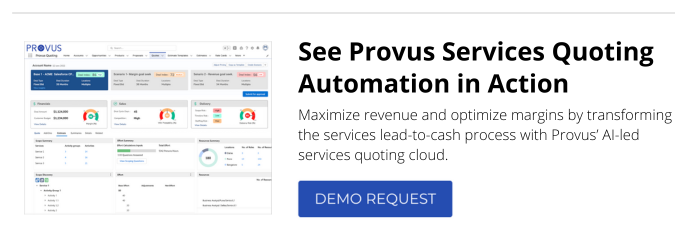CPQ has come a long way since its birth in the early 1980s. That’s when ‘configurators’ started becoming part of the sales process. These allowed teams to offer customers the chance to configure their product while matching product information held in emerging ERP software.
As this product CPQ method became firmly established, knowledge workers started reshaping economies in the late-1990s. Working with professional services organizations (PSOs), they led the way in the rise of transactions and sales based on value-based services and outcomes. The transformation of sales lifecycle management further accelerated in the late 2000s/early 2010s through Apttus (merging under the Conga brand in 2020), regarded as one of the pioneers of enterprise CPQ technology.
With less focus on physical products or tasks, the result was an increase in the services CPQ method. However, while product CPQ organizations have successfully automated Quote-to-Cash processes, many PSOs still need to work on their paths.
That’s because PSOs are trying to customize a more linear product CPQ and make it fit into a more fluid services CPQ methodology. Often with workarounds that don’t work and don’t address the main challenges. Namely, that traditional product CPQ is fundamentally different from services CPQ.
What are the main differences between product CPQ and services CPQ?
Pricing
Let’s start with what makes the world go round: Pricing. A product is a fixed item, at least compared to services. Yes, there are variable dimensions and costs relating to manufacturing, distribution, and transportation. However, product CPQ is primarily a waterfall approach. Enter the data, validate at every step, and generate the quote.
Compare this to some of the variables that are often part of services CPQ:
-
- Time: The time spent on setup probably won’t deliver the ROI that comes in future quarters. The returns will be more variable, with value from services becoming apparent over time. It’s a world away from tangible product-based metrics such as transactions on specific days
- Resources: Selecting and allocating resources involves balancing team skills, availability, roles, responsibilities, and costs. Of course, margins are at risk from conditions and contingencies that may fluctuate over time. On its own, product CPQ isn’t equipped for the complexity involved in pricing these variables.
- Locations: The cost, and value, of a service will change depending on its geographical location. Some services may not even be deliverable within certain regions, or mean extensive changes to quotes and tariffs. Naturally, all this makes it harder to standardize processes and still protect margins.
Configuration
Itemizing a deal isn’t so straightforward when you are offering services rather than items. That’s probably why there’s no such word as servicing.
Instead, the scoping process for services involves collaborating with multiple departments to prepare a quote. Maybe that includes internal SMEs, finance, and governance – all with different inputs that can affect deal accuracy, transparency, and long-term profitability. You’re selling to a committee, where some members are unknown, making it harder to tailor the quote and use the right levers.
Now take this uncertainty, and apply it to a service-led use case that involves a subscription. The subscription model usually incorporates a mix of introductory or freemium plans, prorating, and renewals. Plus for the sales rep, some room to offer upsells and cross-sells too.
That’s a lot of dimensions and areas that can impact margin profitability. It’s a completely different approach compared to static product CPQ methods such as cost-plus, block, and batch pricing.
Quoting
Keeping quotes simple sounds good in theory, but in practice, it’s rarely the case. Especially with professional services organizations. After all, you’ve got to factor in value-based pricing, and price up all the associated benefits that the prospect sees as valuable. Rather than just relying on product CPQ inputs, services CPQ lets you gather production costs, calculate an acceptable margin, and indicate how much flexibility you have when negotiating for profitability.
That’s the thing with value-based pricing in services CPQ. It’s about understanding what a prospect values most, and then aligning the quote to these levers. That may involve several scenarios and quotes to be modeled and delivered. Just to add to the mix, don’t forget unpredictable external factors, such as supply chain pressures, that can have an influence too.
Speed and accuracy are crucial, but trying to apply this to a product CPQ model will lose momentum in the lead-to-cash race. More variables should mean more opportunities for revenue maximization. But without scenario modeling tailored for services CPQ, inaccurate what-if scenarios can become what-will-be margin erosion realities.
Integration
Accurate quoting calls for close integration between sales and delivery, with a seamless journey from the initial quote to document generation. And through to billing, order management, and revenue recognition. Those areas are where you find dimensions and metrics that help guide selling, show progress, and increase margins. To achieve this with product CPQ, you’d need extensive customization, to integrate successfully to minimize manual inputs with delivery processes.
In contrast, services CPQ can develop quotes and work breakdown structures that connect specific services data directly to Professional Service Automation (PSA) systems. For example, ingesting defined data from PSAs to provide recommendations, conduct margin analysis, and better understand historical performance.
AI in services CPQ
Further gains are available when plugging AI into the process. After successful integration, the resulting historical data can be used for training AI models. You can then pick and choose outputs, from optimized recommendations and guided quoting, to predictive analytics and scenario modeling.
There are also opportunities to optimize goal-seek scenarios with AI-powered services CPQ, to build new work breakdown structures based on targeted margin percentages or revenue amounts.
The result is bridging CRM, services quoting, and PSA – unifying the full sales cycle, and bringing visibility for better resource forecasting and management. What’s more, there’s a platform that can make it happen right now.
Delivering services CPQ with purpose
There’s no need to squeeze services CPQ into an ill-fitting one-size-fits-all product CPQ solution. We know what happens when PSOs try that. And we know because that’s what our customers tell us.
Instead, there’s another way to approach services CPQ. Provus offers a purpose-built platform for professional services CPQ. You can quickly scope and adjust quotes, and model what-if scenarios based on your margin optimization strategies.
Your documents can be available centrally. All updates are shown in real-time, without the need to share static spreadsheets and all the risks around invalid formulas. You can work with one source of truth, without prospects referring to duplicated or outdated versions.
Naturally, this makes it as scalable as you need. When you have a best-fit model scenario, store it as an internal framework for your team to use. Knowledge can flow and scale freely.









